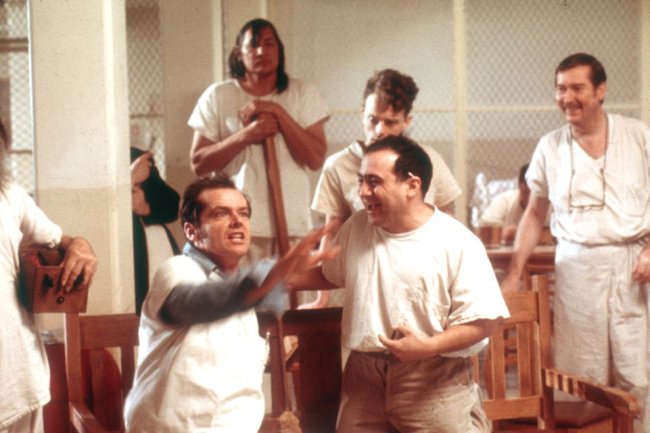What I Wish ‘Oppenheimer’ Had Said
Nearly eight decades after Hiroshima, the world still has to worry about the threat of nuclear weapons. By Peggy Noonan July 27, 2023 6:55 pm ET John Hersey (1914-93) Photo: Bettmann Archive/Getty Images ‘Oppenheimer” is a serious movie, which comes as a relief—that such a film can still be made and become, as this one has, a blockbuster. It carries within it a compliment, that the audience is able to absorb intellectually demanding material. It assumes you know who Neils Bohr is. It contains a great on-the-edge-of-your seat sequence on the first use of the atomic bomb, in Los Alamos, N.M., in 1945. The acting is great, no one’s a dud, and the look and sound are spectacular. It is a film of huge and moving ambition. But—you saw the but coming—i


John Hersey (1914-93)
Photo: Bettmann Archive/Getty Images
‘Oppenheimer” is a serious movie, which comes as a relief—that such a film can still be made and become, as this one has, a blockbuster. It carries within it a compliment, that the audience is able to absorb intellectually demanding material. It assumes you know who Neils Bohr is. It contains a great on-the-edge-of-your seat sequence on the first use of the atomic bomb, in Los Alamos, N.M., in 1945. The acting is great, no one’s a dud, and the look and sound are spectacular. It is a film of huge and moving ambition.
But—you saw the but coming—it isn’t the movie my mind was hoping for. In my view, which I fully admit may be peculiar to me, it missed the essence of J. Robert Oppenheimer’s tragedy. That tragedy isn’t what is considered his persecution during the McCarthy era, after he had became famous as the father of the bomb. It was more personal. It was that Oppenheimer, a brilliant man, probably a genius, wanted to be great, and won his greatness at what he fully understood was a grave cost to the world.
He overrode his qualms and doubts to develop the most lethal weapon in human history, arguing to himself and others that only a weapon so uniquely devastating would convince Japan it had lost the war, thus forestalling an invasion that would yield, by one estimation of the time, one million casualties, of which, obviously, not all would be American. The Japanese would have fought hand-to-hand on the streets and beaches. They would only surrender if Emperor Hirohito told them to do so.
But driving Oppenheimer as I have long read him, and perhaps primarily driving him, is that he wanted to be a great man like his contemporary, the hero of science, Albert Einstein. History provided Oppenheimer with both opportunity and rationale. He would split the atom, create the bomb, bring the peace. But the bomb was—is—a moral horror. So to be great, to achieve his destiny, he had to do something terrible.
He did. That was his tragedy. And, forgive me, a lifetime wandering around quoting, “I am become death, the destroyer of worlds” wouldn’t assuage the resulting unease.
My deeper criticism of the film is that I expected more of Oppenheimer’s reaction to what happened after the bomb was dropped. Before Hiroshima was bombed, at 8:15 a.m. local time on Aug. 6, 1945, everything was theory—mathematical formulae, observed blast radius, calculations and estimates. Only afterward would it be known what actually happened. I expected more of Oppenheimer’s absorbing of the facts of his work, more on how his reflections turned and developed.
He would have absorbed this information indelibly through the work of John Hersey. After the bomb was dropped, magazines and newspapers were consumed with stories of what it meant for the war, what a scientific breakthrough it represented, what it portended for the future. In May 1946 Hersey, a 31-year-old journalist, already battle-scarred—he’d been commended for helping evacuate U.S. military personnel from Guadalcanal—was less drawn to the abstract than the particular, to what actually happened in Hiroshima, to its people and infrastructure, when the bomb came. He went there for the New Yorker, stayed a month, and did his own reporting, independently and with little assistance. He wove a narrative around the first-person testimony of six survivors. In August 1946, the first anniversary of the dropping of the bomb, the magazine published Hersey’s work, breaking tradition by devoting an entire issue to it so no one would miss any part.
It was a masterpiece. It has been called the most important piece of journalism in the 20th century. For the first time people really learned what happened in Hiroshima, and it caused a sensation. You couldn’t hide from yourself, after reading that piece or later the book that came of it, the knowledge of what the A-bomb did. And knowing couldn’t help but affect your thinking.
The writing was straight, factual, matter-of-fact. His British publisher later said Hersey didn’t want to “pile on the agony.” But his plain, simple words said everything: “There was no sound of planes. The morning was still; the place was cool and pleasant. Then a tremendous flash of light cut across the sky. . . . It seemed a sheet of sun.” There was no roar; “almost no one in Hiroshima recalls hearing any noise of the bomb.” But they heard it 20 miles away. Clouds of dust turned the morning into twilight. In gardens, pumpkins roasted on the vine. People ran to the city’s rivers. “Mr. Tanimoto found about twenty men and women on the sandspit. He drove the boat on to the bank and urged them to get aboard. They did not move and he realized that they were too weak to lift themselves. He reached one and took a woman by the hands, but her skin slipped off in huge, glove-like pieces.”
People died from three causes: the huge blast, the fires that followed and something new, radiation poisoning, which no one understood. Somehow people seemed fine, then they expired.
“About a week after the bomb dropped, a vague, incomprehensible rumour reached Hiroshima—that the city had been destroyed by the energy released when atoms were somehow split in two.” There was no name for this weapon, but word of mouth yielded one whose root characters were translated, by Hersey, as “original child bomb.” (On my bookshelf is a book of meditations Thomas Merton later wrote using those words for his title.)
I don’t know if Robert Oppenheimer was a great man, but John Hersey was.
Read More Declarations
- The Talent Strikes Back July 20, 2023
- Spirits in the Skies of Summer July 13, 2023
- May Trump Soon Reach His Waterloo July 6, 2023
In the end, Hirohito, on Aug. 15, spoke on the radio to tell his nation the war was over. Many of those listening in Hiroshima, at speakers set up on what had been public squares, wept, but not because of pro-war fervor. They wept because they had never heard the emperor’s voice. Truly a new age had begun.
I thought “Oppenheimer” would be more of a warning, and I wanted it to be because I think the world needs one. In fairness, the first two hours of the film signal a kind of warning, with a building sense of dread, but it dissipates in the last hour, which gets lost in a dense subplot. I wanted the director, Christopher Nolan, to be an artist picking up unseen vibrations in the air and sensing what most needed to be said.
The world needs to be more afraid of nuclear weapons. We’re too used to safety, to everything working. It’s been almost 80 years of no nuclear use, a triumph, and we just assume it will continue. Those who were healthily apprehensive 50 and 25 years ago aren’t so scared anymore; they think someone’s in charge, it’s OK. My sense is the world has grown less rigorously professional, the military of all countries included, and the leaders of the world aren’t as careful. I guess I wanted a movie that puts anxiety in the forefront of everyone’s mind.
It isn’t entirely fair to say “he didn’t make the movie I hoped would be made,” but yes, he didn’t make the movie I hoped would be made.
Journal Editorial Report: The week's best and worst from Kim Strassel, Bill McGurn and Jason Riley. Images: Zuma Press/Invision/AP Composite: Mark Kelly The Wall Street Journal Interactive Edition
What's Your Reaction?






















